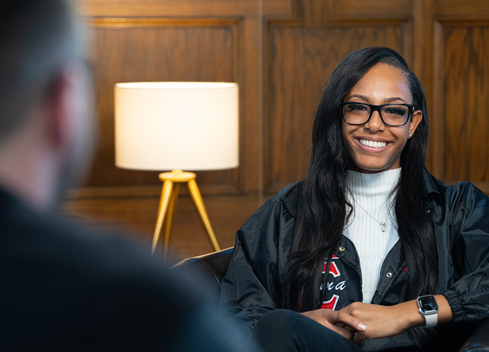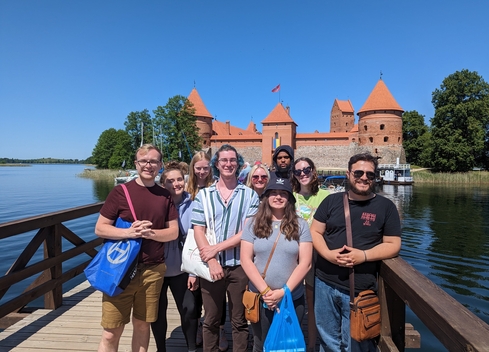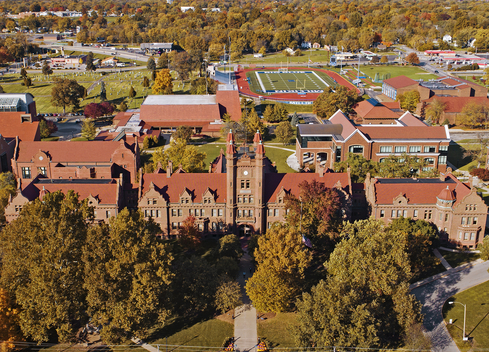Appellate Legal Reasoning – Moot Court
The philosophy program provides philosophy majors as well as Millikin students more generally with the opportunity to participate in a high intensity and high quality performance learning experience: moot court. In order to participate, students must enroll in PH366, Appellate Legal Reasoning – Moot Court. This course is an experiential and collaborative learning experience in which students are taught the essential elements of appellate legal reasoning by Dr. Money and eventually perform their learning before third party stakeholders (e.g., legal professionals, pre-law faculty advisers, law students, etc.). Dr. Money teaches the course each spring semester.
Each year, students who enroll in this course are afforded the opportunity to participate in a state-wide moot court competition held as part of the Model Illinois Government simulation in Springfield, Illinois. At the competition, students work in two-person teams to deliver, based on their analysis of the closed case file materials, persuasive legal arguments before a panel of justices. Each team has a maximum of 30 minutes to present arguments. While team members can divide up the presentation of arguments as they see fit, competition rules require that each team member argue for at least 10 minutes.
During the presentation of oral arguments, justices – a combination of legal professionals from central Illinois, law school students, and college students who have had prior experience participating as attorneys in the competition:
- Ask questions
- Offer rejoinders
- Propose hypothetical scenarios in response to the arguments made by student attorneys
Student attorneys must demonstrate listening skills and the ability to think critically on their feet as they work to respond to the justices. After a round of argument concludes, a formal rubric is utilized to assess student performance in five main categories: knowledge of the case, organization and reasoning, courtroom manner, forensic skills, and responding to questions. Teams advance in the competition based on their performance as assessed by the justices utilizing the rubric.
The on-campus classroom component of PH366 relies on a “simulation” model in which we replicate what will happen at the competition, including conducting oral arguments in class. The competition and, hence, the on-campus classroom component, employs the “closed case” method that is used at most moot court competitions. The closed case file is the file that serves as the basis of the Model Illinois Government Moot Court Competition held in early March. The case file includes numerous items: a statement of the facts of the case, the rulings by the lower courts, select court case precedents, relevant federal and/or state statutory provisions, and relevant constitutional provisions. The course and attached competition involve no research that goes beyond the materials provided in the closed case file. On the basis of this material and this material only, students complete a range of assignments designed to engage them in the central aspects of appellate legal reasoning and prepare them for the competition. This course prepares students for the competition by supervising analysis of the closed case file and by providing structured opportunities for students to develop and practice delivering their oral arguments on campus, before going to competition.
Students who participate in moot court draw on while developing further many of the key skills that are emphasized in our philosophy curriculum as well as our wider University Studies curriculum:
- Critical-analytical reading
- Critical-ethical reasoning
- Oral communication
- Collaborative learning, among others.
It is worth noting that students who participate in moot court represent a very diverse range of disciplines. Student participants during a typical year might have majors or minors in the following disciplines:
- Majors: acting, math, music, philosophy, political science, psychology, and sociology
- Minors: biology, criminal justice, finance, history, political science, Spanish, and writing
Over the past fifteen years, Millikin students have performed exceptionally well. The team and individual awards speak for themselves:
- Team First Place Finishes (9): 2005, 2008, 2009, 2010, 2011, 2012, 2013, 2014, 2020, 2021
- Team Second Place Finishes (10): 2005, 2007, 2009, 2010, 2013, 2014, 2016, 2018, 2020, 2021, 2022
- Team Third Place Finishes (9): 2006, 2007, 2008, 2012, 2013, 2014, 2015, 2020, 2022
- Team Fourth Place Finishes (4): 2012, 2013, 2015, 2020
- Individual Award for Most Outstanding Attorney (8): 2009, 2010, 2012, 2013, 2014, 2016, 2020, 2021, 2022
- Individual Award for Runner Up Most Outstanding Attorney (3): 2011, 2012, 2013
- Individual Award for Most Outstanding Novice Attorney (2): 2016, 2018
- Individual Award for Excellence in Brief Writing (4): 2018, 2020, 2020, 2020
- Individual student elected Chief Justice (5): 2005, 2006, 2015, 2017, 2022
The track record of success by our students – as judged by external evaluators, including legal practitioners and law school students – is clear evidence of the high quality of our program.
For more information about 2022 Moot Court, see: https://millikin.edu/performance-learning-news/student-attorneys-honored-2022-moot-court-competition



